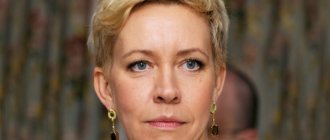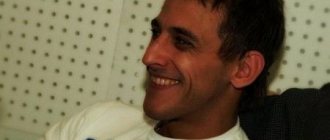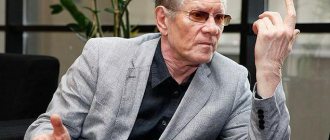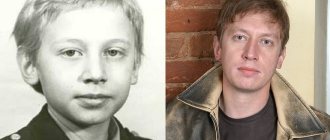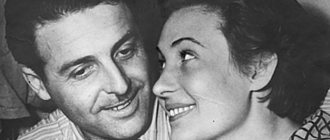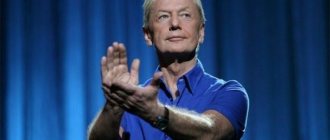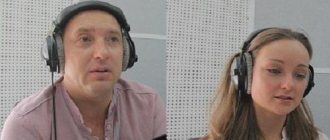Biography
The satirical writer's popularity peaked in the 80s. Mikhail Mishin became known to a wide audience thanks to his participation in the program “Around Laughter”, where his monologues “Voice”, “We approve!”, “We are proud”, etc. were heard throughout the country.
Satirist Mikhail Mishin
But I don’t know everything about his literary activities and work as a screenwriter: Mishin is the author of a number of books, and several films have been based on the author’s scripts, including such well-known ones as “Silva” and “Free Wind.” In the 90s, Mikhail Anatolyevich plunged into translation activities: he began to translate foreign plays and adapt them for production on the Russian stage.
Childhood and youth
Mikhail Mishin (real name – Litvin) was born on April 2, 1947 in Tashkent. The boy spent his early childhood in the capital of Uzbekistan, until he was 7 years old. Then his father was offered a good position in Leningrad, and he moved the family to a new place of residence.
“I had a happy childhood. Someone said that a person either succeeds in the first half of his life or the second. It’s stupid for me to sin... I was loved in the family as an only child. For several years I grew up with my grandmother due to various circumstances,” this is how the artist recalls his childhood.
Mikhail Mishin
Mishin's parents had a direct connection to creativity: his father worked as deputy director of the Leningrad House of Journalists, his mother worked at the Philharmonic. However, the son decided to choose a technical profession and entered the Leningrad Electrotechnical Institute with a specialty in ship electrical equipment. While still a student, he began writing humorous stories and essays, which were published from time to time in thematic newspaper columns.
About personality
The biography of Mikhail Mishin begins in 1947 in Tashkent.
It was then, on April 2nd, that he was born. Anatoly Litvin, the father of the future writer, served as deputy director of the House of Journalists in Leningrad. Mother worked at the Philharmonic. Mikhail Mishin studied at the Leningrad Electrotechnical Institute named after Ulyanov-Lenin. After graduation, he worked in his specialty for 4 years. He started writing during his student years. Thanks to his father, he was able to publish his works on the pages of newspapers in humorous sections. In the 1960s and 1970s, Mishin began working part-time on the Lenconcert stage as a speech artist. Together with Semyon Altov, he reads his own works from the stage. In 1976, Lenizdat published the first book authored by Mikhail Mishin entitled “A trolleybus walked down the street” with a circulation of 65,000 copies.
In the eighties, the writer, not being a professional philologist, was engaged in literary translations of plays by Ray Cooney, Noel Coward and other authors.
Let's now see what the author himself writes about himself. In his biography, he notes that he was born in Tashkent. Afterwards the family moved to Leningrad. And then the future writer ended up in Moscow. He also regularly visited Odessa. He considers himself the author of the word “Approve, sir.” He notes that he often changed his place of residence. In his own words, the writer does not remember well the period of his life from birth to thirty years. The author says that he is used to celebrating all holidays in Odessa. I am sure that I have discovered a new law of nature - “with age, the number of organs in the body increases, and they all hurt.” He managed to earn fame as a tireless joker and joker. Subtle humor allowed our hero to very quickly achieve success as a satirist. The humorist turned to literary activity much later. In the eighties and nineties, he began to engage in creative adaptation and translation of foreign plays.
Creation
One day, Mikhail decided to show his work to his father, who encouraged his son’s literary experiments. And he, to the author’s surprise, approved. This is how the first “Odobryam” sounded in the writer’s life - a word that not only brought Misha fame, it “went” to the people, and this, according to his colleague Arkady Inin, is the highest award.
Mikhail Mishin on stage
When his son had a lot of publications, Anatoly Litvin collected them, took them to work and showed them to one of the editors, Boris Druyan.
“He really liked it, but when my father admitted who the author was, he quarreled terribly with him and began shouting about cronyism. The father reasonably objected that while the editor did not know who wrote the texts, he had a different opinion. He thought and agreed. And in 1976, my first book “A trolleybus was walking down the street” was published,” says Mishin.
The artist did work in his specialty: for four years he was an engineer at the Central Research Institute of Ship Electrical Engineering and Technology. But at the moment when they offered targeted graduate school and other benefits, he refused. He left for free bread. By that time, together with Semyon Altov, he had already been working for several years at Lenconcert as a “speech artist” for a wage of 9 rubles.
Monologue of Mikhail Mishin “We are proud”
In 1977, Mishin, who was already famous, was accepted into the Writers' Union. And in the same year there is a significant meeting with Arkady Raikin. Mishin had long wanted to show the master his works. And friends who worked in his theater arranged a meeting. Raikin called a few days later and offered to do a performance with him.
The author collaborated with Arkady Isaakovich for several years. In tandem, the play “His Majesty Theater” was created. Then Raikin moved to Moscow, “Satyricon” appeared, to which Konstantin Raikin came, and Mishin began to participate with him in the production of “Faces” (1983). The success was enormous. Subsequently, several more works created with the participation of Mikhail Anatolyevich will appear on the stage of Satyricon.
Mikhail Zhvanetsky and Mikhail Mishin
The beginning of the 80s was a fruitful period in the work of the satirical writer. He works as a screenwriter: he wrote the script for the musical films “Silva” and “Free Wind”, directed by Jan Fried. At the same time he goes on stage. In the cult program “Around Laughter,” the satirist not only performed on the same stage with such great artists as Mikhail Zhvanetsky, Arkady Arkanov, Roman Kartsev, Alexander Ivanov and others, but was also the author of many of the works performed.
“There was a period when I gave a lot of concerts and appeared on TV. It seems to me that I found contact with the audience... Then time changed, the old systems fell apart, and I moved away from pop performances...,” the artist said in an interview.
Mishin’s rich biography also includes acting experience. In 1995, Alla Surikova’s film “Moscow Holidays” was released, in which Mishin starred in an episode along with Alexander Adabashyan. He also participated in the films “Genius”, “The Masked Sinner”, “Monday’s Children”, etc.
Alexander Abdulov, Mikhail Mishin and Larisa Belogurova in the film “Genius”
In addition, the 90s became the time when Mishin was actively published. In 1990, the book “Former Future” and the collection “Mixed Feelings” with pop works and aphorisms of the writer were published. In 1991, the next collection, “Approve,” was published, and in 1995, the book “Feel the Difference!” In total, the writer is the author of over ten books.
Back in the late 80s, Mikhail Anatolyevich became interested in literary translations. Friends brought English-language plays, which the writer began to translate exclusively for himself. The first work, “These Free Butterflies,” was staged in one of the Leningrad theaters. This inspired the writer, he began to translate more and more. Famous translations include “The Too Married Taxi Driver” and “Number 13” by Ray Cooney. Mishin is proud to have discovered the work of this writer for the Russian theater.
Mikhail Mishin on television
In 2020, three performances based on Mishin’s translated plays were staged in Moscow: “Vanya and Sonya, and Masha, and Nail” at the Satyricon, “This Wonderful Life” at the Pushkin Theater, and “At the Nikitsky Gate” at the Theater Brothers." Also a satirist, he is the author of the Russian version of the libretto of the musical “We will rock you,” and translated the television series “Friends” (seasons 1 and 2).
Mikhail Mishin is a two-time winner of the Golden Calf award and laureate of the Golden Ostap award. The biography of Mikhail Anatolyevich is dedicated to the personal volume “Anthology of Satire and Humor of Russia of the 20th Century”.
Alexey Mishin: “Doctor of Ice Sciences”
Today, Alexei Nikolaevich Mishin, Honored Master of Sports, Honored Trainer of the USSR and Russia, celebrates his 75th birthday.
He was born on March 8, 1941 in Sevastopol in the family of teachers of the naval school Nikolai Ivanovich Mishin and his wife Tatyana Valentinovna Delyukina. After the war, he and his parents moved first to Tbilisi and then to Leningrad. My father loved to skate and often took his children, Alyosha and his older sister Lyudmila, to the skating rink, having borrowed skates for them from his friend.
Alyosha with his father, Nikolai Ivanovich Mishin. 1940s
One day Lyudmila, a university student, having received a scholarship, gave her brother “snowmen”, and his father, passing by the Anichkov Palace, saw children skating around a flowerbed and decided that classes in the figure skating section would be useful for his son and would distract him from dangerous street fun. So in 1956, Alexey began figure skating in a section at the Palace of Pioneers under the leadership of Nina Vasilievna Leplinskaya.
Early 1950s
Then Maya Petrovna Belenkaya became his coach. This is how she recalled her work with Mishin: “He came to me as a teenager, he went to the eighth grade. By that time, his peers - Kurenbin, Fomin - were already performing “masters”, and Lesha only had a second adult rank. He understood well that the kids there were much stronger, ready to compete at the Union championship, and he was lagging behind them. Mom and Dad brought him to me.
[…] They came to me and said: “Maya Petrovna, well, take him, why is the guy disappearing?” I think: “What should I do? Should I take it or not? As a coach, I was not at all interested in this. How much work does it take to work with him for him to create a name for a coach! “Okay,” I say, “I’ll take it.” Just let me check what he can do first.”
Late 1950s
I took him into the hall and started watching. He began to jump - a high jump. I looked at his turnout and his step was on the reverse side, like a ballerina’s. I was stunned. I say: “Lesha! Where have you been? You should have come sooner, you would have reached such heights now, you would have gone to international competitions. And now I can’t guarantee anything, you missed the time.” - “Okay, Maya Petrovna, I’ll try. You can try. Mom and Dad really want it.” I ask: “And you?” - “And I’ll try.”
Early 1960s
He was so good-natured and always treated everything with humor. He always knew how to create a cheerful mood. Such people are rare among athletes. Apparently, young people like it too. He can somehow say a few words very succinctly - and the person is already in the mood. And our children, of course, were drawn to him.
In short, he began to try. He quickly completed the first category, went to the Union championship as a candidate master, and competed with adults. But then obligatory figures occupied a very large place. Forty-two figures were supposed to be made. And this is a lot of work. And he just couldn’t master it! The free dance will skate. And technically not very good, but artistically... I heard the music! There was such a song “Fly, pigeons, fly”, we made a program for it, it turned out very nice. It’s a simple program, of course, but you have to start somewhere” (L. Chernyshova, “Alexey Mishin. 6.0.”, St. Petersburg, 2007).
Alexey Mishin with his mother, Tatyana Valentinovna Delyukina. Late 1950s - early 1960s.
Mishin's balletic stretch and jumping ability were legendary. This is what Alexei’s friend, Igor Borisovich Moskvin’s student Vladimir Kurenbin, recalled about this: “He had an extraordinary step - no other girl had such a step. He raised his leg like a hand. He jumped with his foot, for example, to the top crossbar of a football goal. Easily! He almost reached the basketball hoop with his foot.
Libelu did what no one else could. The turnout is incredible. I remember we were going to the subway on an escalator, he was standing not only in fifth position, but his legs were unfolding more than you could imagine. And he didn’t get tired of it. He stands, holds the handrail with his hand, talks - but his legs are turned out. As they said, he has the legs of a professional dancer" (L. Chernyshova, "Alexey Mishin. 6.0.", St. Petersburg, 2007).
Early 1960s
Alexey, therefore, had extraordinary abilities for figure skating, but due to the fact that he came to the sport late, he was unable to achieve outstanding results in it as a single skater. His best achievement was 3rd place at the 1964 USSR Championship.
Since 1967, he began performing in a sports pair with Tamara Moskvina. The coach of the new duet was Igor Borisovich Moskvin, who managed to find for his students an avant-garde style that fully corresponds to the physical characteristics of the couple. Already in their first season, they entered the national team of the country and rounded out the top six pairs at both the European Championships and the World Cup.
1967
Their demonstration dance “Gypsy” created a real sensation. Here’s what sports journalist Lyudmila Dobrova wrote about it: “The skating rink (in the town of Vcele, not far from Ljubljana, where the demonstration performances took place. - L.M.) was located in the open air. The stands around it are tiny and can only accommodate a few hundred people. And there were significantly more people who wanted to meet the best skaters of the continent. What were they supposed to do?
"Gypsy girl." 1967
Local fans quickly found a way out. Right next to the skating rink, the mountain rises steeply. Figure skating fans from Vcele and dozens of surrounding villages set up improvised stands for themselves. The performances of Lyudmila Belousova and Oleg Protopopov, Emmerich Danzer and other favorites were a huge success.
"Gypsy girl." 1967
But Tamara Moskvina and Alexey Mishin enjoyed no less that evening. They showed the audience their dance “Gypsy”. The dance was choreographed specifically for the championship. The song was sung in Serbian by Radmila Karaklajic. What happened that evening at the skating rink and around the Vtzel skating rink! The spectators danced, sang along with Karaklaich, twitched their shoulders, in a word, they were participants in a cheerful dance. In the midst of this mass dance, I raised my eyes, looked at the mountain and simply froze. The mountain came to life. She also danced. She was walking. And when the dance ended, the mountain moved to the thunder of applause: hundreds of people ran to the skating rink to congratulate Tamara Moskvina and Alexei Mishin (L. Dobrova, E. Tchaikovskaya, “In the Frame of the Skating Rink”, M., “Soviet Russia”, 1970 ).
1968
In 1968, Moskvina and Mishin, completely unexpectedly for everyone, including themselves, became silver medalists at the 1968 European Championship. After the short program they were sixth, and after the free program they jumped to second place, beating very strong opponents - a couple from the GDR Heidemarie Steiner - Heinz-Ulrich Walter, West German duets Margot Glockshuber - Wolfgang Danne and Gudrun Hauss - Walter Hefner and our debutants Irina Rodnina and Alexei Ulanov. At that time it was like jumping in over your head.
1968
Tamara and Alexey, not ready for such an outcome of the competition, were about to leave the Sports Palace, and Mishin even managed to change into a colorful knitted sweater, but then they were invited to the podium, and Moskvina and Mishin stood on it: Tamara in a dress for a free program, and Alexey is in a “civilian” sweater, trousers and boots.
Alexei Mishin and Tamara Moskvina with Polish figure skaters Yanina Poremska and Piotr Szczypa and friends and rivals Lyudmila Belousova and Oleg Protopopov in the Olympic Grenoble. 1968
At the Olympic Games in Grenoble, they, unfortunately, made several mistakes in their free program and remained 5th, and at the World Championships in Geneva they lost very little to the bronze medalists, Americans Cynthia and Ronald Kauffman, and took 4th place.
Free program at the 1968 Olympics
In 1969, Moskvina and Mishin were the first to win the USSR Championship against the hitherto invincible Lyudmila Belousova and Oleg Protopopov. “It seemed simply indecent to beat them then,” Alexey Mishin recalled about this event. — At the press conference in Yubileiny, where a huge crowd of journalists had gathered, there was some awkwardness. And although Belousova and Protopopov were no longer skating better than us, they were still incredibly charming. However, charm is charm, and grades are given not only for this.
Tamara Moskvina and Alexey Mishin - USSR champions in 1969
That day I said probably the smartest phrase in my entire life. We are asked: “What do you think about this?” Moskvin sits, silent. There was a pause. And then I said: “You know, I think we defeated them, but did not surpass them.” And all the newspapers wrote it the next day” (L. Chernyshova, “Alexey Mishin. 6.0.”, St. Petersburg, 2007).
1969 European Championship
Next in the season there was “bronze” at the European Championship and “silver” at the World Championship on completely Soviet podiums for the first time in history. Tamara and Alexey also delighted the audience with a new demonstration dance to the song “The Lame King,” which invariably caused delight in the stands.
Demonstration dance "The Lame King". 1969
After the 1969 season, Moskvina and Mishin left the sport. Alexey soon graduated from LETI, Faculty of Automation and Computer Engineering. By that time, he became interested in the theoretical development of rotational movements in figure skating techniques and began to study these processes from the standpoint of biomechanics. His father, a specialist in theoretical mechanics, pushed him to this. Alexey began to think about how to combine theoretical mechanics and an aesthetic sport.
He studied in graduate school at the Lesgaft GDOIFK, defended his dissertation and received the academic degree of Candidate of Pedagogical Sciences. For many years he has successfully combined his teaching activity at the St. Petersburg Academy of Physical Culture with his work as a coach.
Alexey Nikolaevich with his first student Yuri Ovchinnikov. Mid-1970s
Gradually, Mishin’s unique methodology was created, the theory was introduced into practice in classes with students. Alexey Nikolaevich managed to create his own school of figure skating, in which he successfully applies his scientific developments. Among his students are Tatyana Oleneva, Yuri Ovchinnikov, Anna Antonova, Vitaly Egorov, Alexey Urmanov, Alexey Yagudin, Evgeny Plushenko, Arthur Gachinsky, Elizaveta Tuktamysheva and others.
Professor Mishin was awarded the Order of Friendship of Peoples, the medal “For Services to the Fatherland”, II degree.
Alexey Nikolaevich and his “star” students Evgeni Plushenko, Alexey Urmanov and Alexey Yagudin. Mid-1990s
In the book by E. Vaitsekhovskaya “Moskvins. Ice for two” Alexey Nikolaevich talks about his work: “I myself only realized over time that a strong coach is not the one who has very strong sides, but the one who has no weaknesses. If there is a gaping hole somewhere in an athlete’s preparation, then in an extreme situation everything that has been accumulated over the years can easily fall into this hole. I have seen examples many times. When I started working myself, the most difficult thing was to weigh the proportional importance of different components: how many lifts, steps, rotations there should be. How much attention to pay to the purity of edge skating in compulsory figures, and how much to the geometry of the figures themselves. Finding this balance is not so easy.
Alexey Nikolaevich with his student Elizaveta Tuktamysheva. First half of the 2010s
[…] There is always some chance in sports. If three-time Olympic champion Irina Rodnina had been born not in Moscow, but, say, in Syktyvkar or Ulan-Ude, if she had not met her coach Stanislav Zhuk, would the world have had such a figure skater? […] What would I become if I was born in Magadan? Certainly not a figure skating coach. And then you just need to work. You don’t have to be famous - people intuitively feel if a coach has a spark of God. The students begin to “float” themselves. And only then, in this oversaturated student’s solution, crystals and crystals inevitably begin to appear.
Alexey Nikolaevich and Tatyana Nikolaevna Mishin. 2020 (?) year
[…] It’s quite difficult to come up with something new in figure skating. This requires a lot of source material and experience. Both someone else's and your own. By the way, I find myself thinking that before we all didn’t consider it shameful to film and record. And now most of our coaches are only skeptical about what is happening on the ice and practically do not use what comes to figure skating from the West, from other specialists.
[…] When a coach says that he considers the main thing to be to embody music on the ice, then for me it’s, excuse me, baby talk on the lawn. This is not what you need to think about. It’s about winning a medal and defeating all rivals” (E. Vaitsekhovskaya, “Moskvins: Ice for Two”, St. Petersburg, “Amphora”, 2011).
Alexey Nikolaevich is happy in his family life: he has a wife, Tatyana Nikolaevna, his former student, and now his colleague, and two sons, Andrei and Nikolai. He is a passionate fisherman and gardener, as well as an excellent cook. He has two Asian Shepherds at home.
Personal life
Mikhail Mishin got married for the first time 5 years after graduating from college. The satirist’s wife was philologist Irina Kardashinskaya-Braude. The husband and wife lived together for 15 years, from 1970 to 1985. The couple had a son, Alexander (born in 1972), who now lives in the USA.
Mikhail Mishin and Tatyana Dogileva
The whole country knows about the artist’s second marriage: in 1986, he married the famous actress Tatyana Dogileva. The couple met on the set of the film Free Wind. Mishin wrote the script for the film, and the director invited Tatyana to play the main role of Pepitta.
“Some kind of intrigue lasted for a long time, Tanya refused. But as a result, she played in this film, and we met at the end of filming, in Leningrad,” recalls Mikhail Anatolyevich.
Mishin and Dogileva lived for over 20 years and filed for divorce in 2008. In 1994, the couple had a daughter, Ekaterina. The girl graduated from art school and began her acting career in the USA.
Mikhail Mishin with children
In 2009, information appeared about changes in the artist’s personal life: he was allegedly courting actress Maria Golubkina. The participant in the rumors herself denied the information.
The satirist has maintained excellent relationships with his ex-spouses and often communicates with their children. In 2020, a happy father published a photo online with his son and daughter on a joint vacation.
Mikhail Mishin now
In 2020, Mikhail Mishin returned to the stage after a 20-year break. On April 5, the first meeting with the writer in 20 years took place in St. Petersburg. And on April 19, he performed in Moscow, at the Theater at the Nikitsky Gate, with new monologues.
Mikhail Mishin in 2018
Now the artist is returning to stage activities and is actively working as a playwright.
Mikhail Mishin's career on stage and in other industries
In the late sixties, Mikhail Mishin got a job at Lenconcert as a speech artist. In this capacity, he became quite famous in the western regions of the USSR. His performances were broadcast on television and radio, and his concerts always attracted large crowds. The subtle humor of our today's hero allowed him to make a name for himself in the world of Soviet satire in a matter of years. He made significant connections and talented friends. One of these was the famous comedian Semyon Altov, with whom Mikhail Mishin performed as a duet for a long time.
Everything was going quite well, but at some point our today’s hero decided to realize himself in a new field and took up writing his own book. The writer's first work was published in 1976. Imbued with subtle humor, the book “A Trolley Bus Walked Through the City” very soon became very popular in the USSR and was sold in a total circulation of 65 thousand copies.
After this, the talented humorist and writer wrote several more literary works. Among these were mainly collections of satirical stories and pop works. In total, Mikhail Mishin wrote about ten different books during his life, many of which were subsequently republished and released in the form of new collections of stories. Among the author’s most popular publications are the books “Approve”, “Above the Surface”, “Mixed Feelings”, as well as some others.
In parallel with his writing, Mikhail Mishin often worked in other industries. In the eighties, he wrote several scripts for popular Soviet films. His works include the films “Silva”, “Free Wind”, as well as several episodes of the film anthology “Exceptions Without Rules”. All these films were released between 1981 and 1986.
Among other things, in the eighties and nineties, Mikhail Mishin began to professionally translate and creatively adapt foreign plays. In this capacity, he became known after staging a number of theatrical works by Ray Cooney, Noel Coward and some other talented authors.
One of the last truly striking works in the biography of the talented writer was the adaptation of the British musical “We Will Rock You”. This production was presented to Russian audiences in 2004.
During his long life, our today's hero managed to try himself in a wide variety of industries. In this context, one cannot help but note the fact that for a long time Mikhail Mishin even worked as a film actor, playing mostly small roles in a variety of Russian and Ukrainian films. The most famous works of our today's hero in this capacity are the films “The Man from the Boulevard des Capuchins”, “The Masked Sinner”, “Moscow Holidays”, as well as some others. He worked on the same set with such actors as Nikolai Karachentsov, Andrei Mironov, Elena Yakovleva and others.
